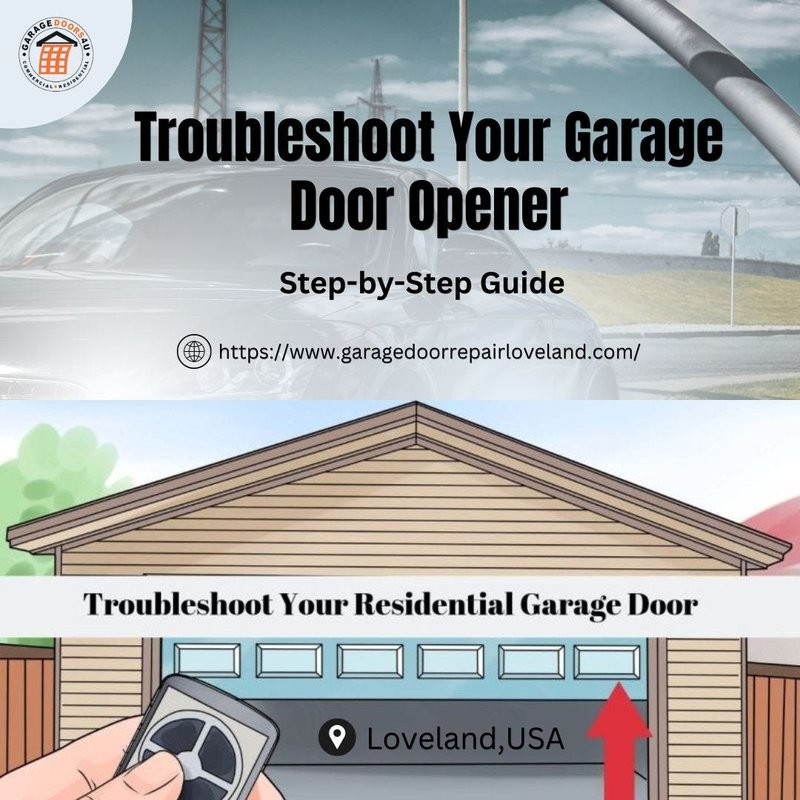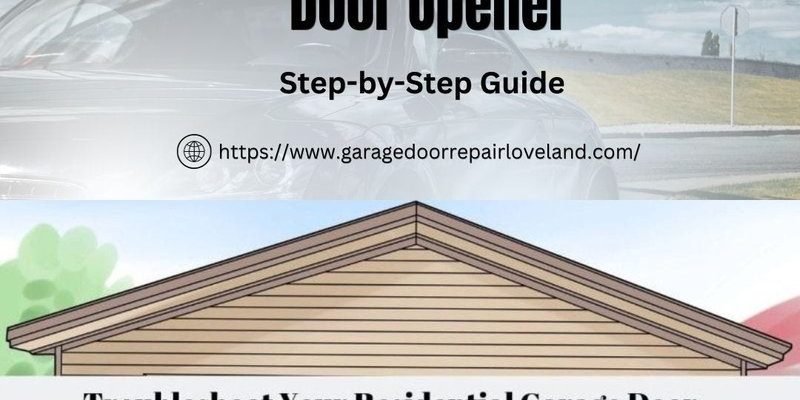
There’s a good chance you’re using a popular model like a Chamberlain or LiftMaster. These brands are well-regarded for their reliability, but even the best systems can have quirks. Maybe you’re wondering if it’s a mechanical issue or perhaps just a minor adjustment. Whatever the case, we’ll cover everything you need to figure it out.
Why Is My Garage Door Opener So Loud?
Understanding why your garage door opener is loud is the first step in solving the problem. The noise could result from various factors, from installation quirks to wear and tear over time.
Mechanical Problems: Sometimes, the noise might stem from loose or worn-out parts within the opener. Components like the motor, drive belt, and chain can wear down, leading to grinding or rattling sounds.
Misalignment Issues: If the garage door tracks are misaligned, this can cause the door to strain against the opener. This strain can create additional noise during operation.
Environmental Factors: The materials of your garage or the presence of nearby items can amplify sounds. Sounds bounce off hard surfaces, making everything seem louder.
Recognizing where that noise is coming from can often point you toward the solution.
Step 1: Check the Installation
Let’s start at the beginning—installation. Improper installation can be a significant source of noise. Here’s what to look for:
- Bracket Placement: Ensure that the mounting brackets are secure. If they’re even slightly loose, they can rattle when the door moves.
- Level Alignment: Use a level to check that your opener is installed straight. An uneven opener can cause the door to operate noisily.
- Clear Path: Make sure there aren’t any obstructions in the path of the door or the opener. Even a small clutter can cause funky noises.
After double-checking these points, you can often determine if the installation is the root of your noisy problem.
Step 2: Lubricate Moving Parts
If everything seems well-installed, the next step is lubrication. Just like a good ol’ bike chain, your garage door opener needs a bit of grease to run smoothly.
When parts are dry, they can create a lot of friction, leading to annoying sounds. Here’s what you can do:
- Garage Door Tracks: Use a silicone spray or garage door lubricant on the tracks where the rollers move. Avoid WD-40 since it attracts dirt.
- Roller Bearings: Apply a small amount of lubricant to the roller bearings. This helps them glide smoothly and quietly.
- Gear and Sprocket: For chain-driven openers, ensure the gear and sprocket are properly lubricated.
A little lubrication can go a long way in quieting down a noisy garage door opener!
Step 3: Tighten Loose Parts
With lubrication done, the next task is to tighten any loose components. Over time, vibration can cause screws and bolts to loosen, leading to increased noise during operation.
Here’s how to tackle this:
- Screws and Bolts: Go around and check all the screws and bolts on the opener itself. Use a screwdriver or wrench to tighten them appropriately.
- Door Tracks: Make sure the door tracks are bolted securely to the wall and ceiling. A loose track can cause jarring noises when the door moves.
- Chain or Belt Tension: If you’re using a chain or belt opener, make sure the tension is adjusted properly. Too loose, and it can flap and rattle.
This simple step can make significant noise reductions.
Step 4: Examine the Rail and Drive System
Now that we’ve covered basic adjustments, let’s look at the drive system. Whether you’re using a belt, chain, or screw drive, each has its quirks that can contribute to noise.
- Belt Drive Systems: If you’re using a belt drive, check for fraying. A worn belt can create noise as it struggles against the pulleys.
- Chain Drive Systems: Ensure the chain is clean and well-lubricated. Sometimes, chains can stretch over time, affecting performance.
- Screw Drive Systems: Like the others, these should also be lubricated. Dirt buildup can create a lot of noise that’s easy to miss.
By examining these crucial areas, you can pinpoint exact problems causing excessive noise.
Step 5: Check for Electrical Issues
Believe it or not, electrical issues can cause your garage door opener to sound louder than normal. If the motor is struggling or getting insufficient power, it may produce increased noise.
Here’s what to investigate:
- Power Supply: Check if the power outlet works correctly. Unstable power can affect the opener’s performance.
- Wiring: Inspect wiring for any visible damage. Sometimes, frayed wires can interfere with functionality, generating unwanted sounds.
- Remote Control: If you’re using a remote, make sure it’s correctly paired. Sometimes the opener will try to sync with a remote that hasn’t set properly.
With this check, you can pinpoint whether the electrical system is at fault.
Step 6: Consider Soundproofing Options
Even after you’ve done all the troubleshooting, the garage door opener may still be loud due to how sound carries. If that’s the case, you might want to consider soundproofing options.
Here are some ideas:
- Insulated Garage Door: Upgrade to a garage door that has insulation. This can help muffle sounds significantly.
- Soundproofing Mats: Placing rubber mats under your garage door opener can help absorb noise.
- Weatherstripping: Add weatherstripping around the door to help seal off some of that annoying sound.
These adjustments can help create a quieter environment overall.
Step 7: Replace Worn Parts
After exploring all these troubleshooting steps, you might discover some parts are simply worn out. If that’s the case, replacing them is often the best solution.
- Rollers: If your rollers are noisy, consider replacing them with nylon ones, which tend to be quieter.
- Belt or Chain: If the belt or chain shows significant wear, replacing it with a new one can substantially reduce noise.
- Motor: Lastly, if the motor is the source of the noise, you may need to consult with a professional about the replacement.
Don’t hesitate to address these issues, as they can greatly improve performance!
Step 8: When to Call in a Professional
If you’ve gone through all these steps and your garage door opener is still loud, it might be time to call in a professional. Sometimes, the underlying issues require expertise that goes beyond DIY fixes.
Here’s when to consider that:
- Complex Mechanical Problems: If the motor or drive system seems damaged, a professional can diagnose and fix it safely.
- In-depth Alignments: If tracks or sensors are significantly misaligned and you’re uncomfortable adjusting them yourself, a technician is the best option.
- Electrical System Issues: For any electrical problems that seem beyond the basics, an electrician or garage door specialist will have the skills to resolve them.
Sometimes, it’s worth knowing when to call in backup, so don’t hesitate to seek help.
You’ve made it through the troubleshooting process! If your garage door opener is too loud after installation, there are many reasons but just as many remedies. From checking the installation to lubricating moving parts, each step brings you closer to a quieter garage experience.
Being proactive about your garage door’s maintenance can save you from headaches down the road. Whether you opt for simple DIY fixes or need a professional to lend a hand, you’ll soon be back to enjoying a peaceful and efficient garage door operation. Here’s to quieter days ahead!
